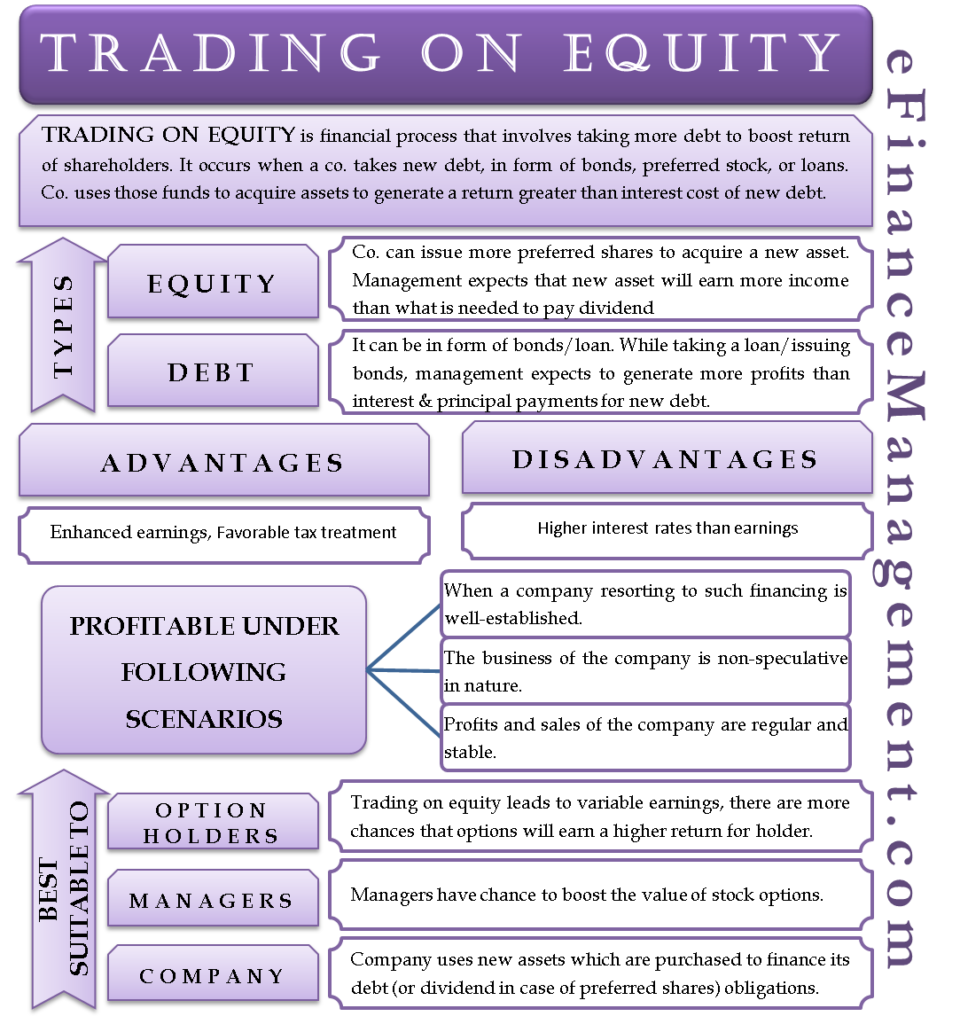Trading on Equity is a financial process that involves taking more debt to boost the return of the shareholders. Trading on Equity occurs when a company takes new debt in the form of bonds, preferred stock, loans, etc. The company uses those funds to acquire assets to generate a return greater than the interest cost of new debt.
Trading on equity – also known as financial leverage – is considered successful if the company generates a profit and a higher return on investment for the shareholders. Companies usually go for trading on equity (instead of raising capital via issue for shares) to improve their earnings per share (EPS).
The term gets its name from the fact that creditors lend money to a company based on its equity strength. So, the company takes advantage of the equity to borrow funds on reasonable terms. When the borrowed amount is relatively large compared to the equity, it is termed ‘trading on thin equity.’ And, when the borrowing is small, the company is said to be ‘trading on thick equity.’
Types of Trading on Equity
This method of financing can occur using both debt and equity.
First, let’s talk about equity. A company can issue more preferred shares to acquire a new asset or fund expansion. In such a case, management expects that the new asset or expansion will earn more income than what it needs to pay a dividend for the newly issued preferred shares.
Talking of debt, it is the most common source of funds. It can be in the form of bonds or a loan. While taking a loan or issuing bonds, management expects to generate more profits than the interest and principal payments for the new debt.

Advantages of Trading on Equity
Trading on equity offers two advantages
Enhanced earnings
By borrowing funds, the company creates a chance to earn more revenue by acquiring new assets.
Favorable tax treatment
The interest expense on the fund borrowed is tax-deductible. So, it lowers the tax burden on the borrower. In other words, the debt reduces its net cost to the borrower.
Disadvantages of Trading on Equity
Higher interest rates than earnings
Trading on equity is not always favorable. It may lead to disproportionate losses if a business is unable to pay off the interest expense. Financial managers must note that such borrowings can prove extremely risky for a business, depending on short-term borrowings to fund its operations. A sudden rise in the short-term interest rates may increase the interest expense burden and could even lead to losses.
So, it can be said that trading on equity has the potential to boost the returns for shareholders. But, it also presents the risk of bankruptcy if the cash flows are below the expectations.
When it’s a Success?
This type of financing is profitable under the following scenarios:
- When a company resorting to such financing is well-established.
- The business of the company is non-speculative in nature.
- Profits and sales of the company are regular and stable.
Based on the above three scenarios, it is seen that public utility concerns often use such a financing concept. Such organizations have enough liquidity to borrow on a large scale.
Best Suitable for
Since trading on equity may lead to uneven earnings, it increases the recognized cost of stock options. It is known that option holders are more likely to cash in their options when there is a rise in earnings. And, since trading on equity leads to more variable earnings, there are more chances that options will earn a higher return for the holder.
So, considering this, we can say that managers (not owners) are more likely to use such an option. Using the concept, managers have the chance to boost the value of stock options. On the other hand, family-run businesses will show more interest in financial stability to avoid this financing technique.
Overall, we can say that trading on equity is a kind of trade-off. A company uses its equity to get new funds to purchase new assets. In turn, the company uses those new assets to serve its debt (or dividend in case of preferred shares) obligations.

